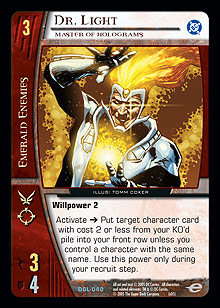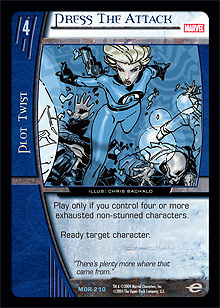
 As everyone should know by now, the reign of Dr. Light, Master of Holograms has been ended by Rama-Tut’s unwillingness to work the way the Doctor wanted him to. Being a pharaoh definitely involves lots of working and dying, but all the work is traditionally done by slaves, and the pharaoh dies just once to enjoy his luxurious afterlife in the huge monument that was built for him. So it’s no big surprise that after a while, Rama-Tut decided to stop dying a million times and doing all the dirty work for the Doctor without even being properly paid.
As everyone should know by now, the reign of Dr. Light, Master of Holograms has been ended by Rama-Tut’s unwillingness to work the way the Doctor wanted him to. Being a pharaoh definitely involves lots of working and dying, but all the work is traditionally done by slaves, and the pharaoh dies just once to enjoy his luxurious afterlife in the huge monument that was built for him. So it’s no big surprise that after a while, Rama-Tut decided to stop dying a million times and doing all the dirty work for the Doctor without even being properly paid.
So, we all have to do the math again, trying to reduce our opponent’s endurance to 0 over multiple turns and combat phases instead of just choosing a number greater than 50 and entering our attack step once. That is pretty boring, isn’t it? Oh, wait, that’s what the game was meant to be about. So it might be not too bad, after all.
We will always have combo decks, and they’re good because they keep the game from getting too combat-oriented. But to keep the game balanced, combo decks should need about the same number of turns to win as beatdown decks do. The “Light Show” was just too fast and too resistant to disruption to be acceptable. So why is speed an issue? Every additional card drawn reduces the randomness of your draw and gives you something closer to an average hand. The longer the game lasts, the more likely it is that you’ll be able to play your deck as you intended to. Drawing two cards per turn is one of the design concepts that make the Vs. System so much less random than other trading card games; it is good for the game to last an average of seven or so turns to give every deck a decent chance to do what it was meant to do. To keep the game as balanced and un-random as it is now, a drastic reduction in the average number of turns played should be avoided at all costs.
Adopting your general game plan to the variation of actual cards drawn and to interactions with your opponent’s characters and unknown cards is what the game is all about. And that is also the way everybody should want it to be. Ideally, we want every single game to be decided by the players’ skills, not by luck of the draw. Therefore, we should not want combo decks to be the best decks in a format. Their tendency to depend on the effects of certain cards or groups of cards takes some depth out of the game. The best player in the world cannot win with a combo deck if he or she is missing an important part of the combo or the search with which to fetch it. There are no decisions to be made in that situation, so play skill just does not matter there. With a combat oriented deck, there is also a lot that can go wrong, but even with multiple missed drops, you can stay in the game with the many plot twists you drew instead of characters. In fact, I have won many games where my opponents misjudged my situation when I had nothing to recruit in a later turn, not realizing that my hand had to be filled with plot twists that I used to make up for the character disadvantage.
 With a combo deck, you must try to get all of the parts together, and doing so definitely includes multiple hard choices. So I am not at all saying that combo decks are easy to play. If your opponent interferes with your evil plan, it gets even trickier, but you simply cannot win with only half of your combo. With Sentinels, you can win easily without drawing your best cards (Bastion and Magneto, Master of Magnetism), and the same is true for Teen Titans, which can win even without Terra, Red Star, Garth ◊ Tempest, or all of their copies of Teen Titans Go! and Press the Attack. And that alone is a reason, at least for me, to play this great game. Sometimes your hand and board gives you virtually no way to lose, but most of the time, playing skill determines the result of the match. Much of the fun and good stories in Vs. are about winning after the spectators left your table, the win looking impossible, to tell your friends that you’d surely lost.
With a combo deck, you must try to get all of the parts together, and doing so definitely includes multiple hard choices. So I am not at all saying that combo decks are easy to play. If your opponent interferes with your evil plan, it gets even trickier, but you simply cannot win with only half of your combo. With Sentinels, you can win easily without drawing your best cards (Bastion and Magneto, Master of Magnetism), and the same is true for Teen Titans, which can win even without Terra, Red Star, Garth ◊ Tempest, or all of their copies of Teen Titans Go! and Press the Attack. And that alone is a reason, at least for me, to play this great game. Sometimes your hand and board gives you virtually no way to lose, but most of the time, playing skill determines the result of the match. Much of the fun and good stories in Vs. are about winning after the spectators left your table, the win looking impossible, to tell your friends that you’d surely lost.
What is the difference between the following two statements?
“I did not draw a single Alfred Pennyworth the whole game.”
“I did not have Bastion on turn 6, but my opponent did.”
The difference is that after the second sentence, you can proceed to tell your friends how you won despite the lack of the important card. And as Gary Wise stated in a recent article, “There’s nothing like a good story to share with buddies, to laugh over, to analyze, and to repeat.” That is the reason why I prefer playing non–combo decks, although I would have played Doctor Light at the next European $10K because of the deck’s raw power.
Playing the Doctor Light deck is an awesome experience and you should definitely give it a try if you haven’t yet, but I am sure it was correct to remove it from the metagame. The amount of hate cards that every deck would have needed to combat it would have been too large. Then, the deck would have been hated so much that nobody would have played it anymore. That would cause decks to include less and less hate as the combo deck all but leaves the environment, which in turn would be followed by a re-emergence of the combo deck. Lather, rinse, repeat.
Correctly guessing whether or not a deck is playable at the next event should not be the deciding factor for whether you will finish that event in first place or last.
So, enjoy the last days with the “Light Show” and then explore the new format—it will probably be just fine again.
HaJo